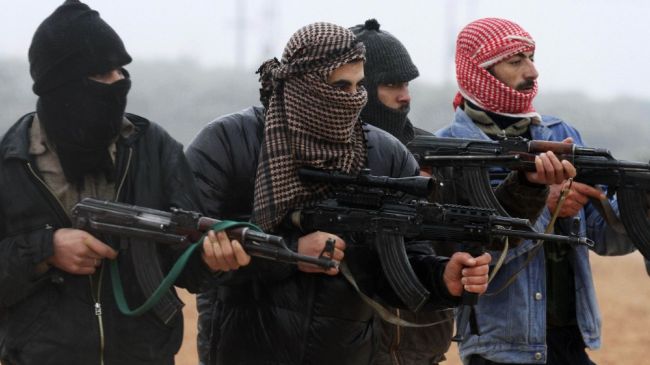World alarmed at emerging extremist groups in Syria

 More than two years into the start of the Syria crisis, the emergence of different extremist militant groups in the Arab country alarms the Syrian people as well as the international community.
More than two years into the start of the Syria crisis, the emergence of different extremist militant groups in the Arab country alarms the Syrian people as well as the international community.
A plan the Pentagon has been provided by the so-called free Syrian Army, and published in the Washington Post, offers a simple classification of the armed groups, their numbers and inclinations.
The map divides the militants into five major groups including the Free Syrian Army, which is made up of some 50,000 forces, including renegade army soldiers and officers.
The 37,000-strong Syrian Islamic Liberation Front and the Syrian Islamic Front – which includes some 13,000 Salafi extremists – are two other militant groups supported by Saudi Arabia.
Qatar supports a separate Salafi group known as Ahfad al-Rasoul Brigade with around 15,000 forces, and the 6,000-strong extremist al-Nusra Front is affiliated with the al-Qaeda cell in Iraq.
While the extremist militants engage in terrorist attacks on the Syrian people and government, moderate opposition forces are calling for a variation of Europe’s Marshall Plan following the Second World War to lead Syria toward a structural renewal.
However, fears have been raised that a possible overthrow of Syrian President Bashar al-Assad would lead to a violent confusion, much deadlier than what gripped Iraq following the US-led invasion of the country in 2003.
There are also elements that support dialogue with the Assad government to prevent the repeat of the violence in Iraq, and oppose a drastic restructuring of the army the way Washington did in Iraq.
According to the Washington Post, the protraction of the Syria crisis only complicates the situation on the ground as more militant groups join the conflict, acting of their own accord and in defiance of the Free Syrian Army and other militias.
The militants, mostly extremist Sunnis, openly disapprove of West-dwelling opposition figures. This has forced countries such as Jordan, which initially voiced strong support for the armed struggle against the Assad government, adopt a more cautious position now, avoid explicit support for the militants and even warn of a possible spillover of al-Qaeda-linked terrorism in the region.
The West and Damascus both state that large numbers of foreign nationals, including Europeans, have entered Syria – from some 40 countries across the world – to fight alongside anti-Assad militants.
The Washington Post has warned that the post-Assad Syria might experience greater bloodshed and violence given the militants’ attempts to access and use chemical arms and other weapons of mass destruction.







